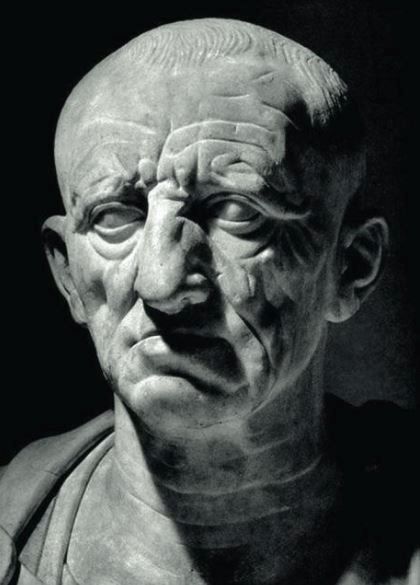Cato starší nejznámější citáty
Cato starší: Citáty o lidech
Cato starší citáty a výroky

„Všechny národy rozkazují svým ženám, my rozkazujeme národům, ale naše ženy rozkazují nám.“
Zdroj: [Stejskalová, Helena, 4x ženy v Římské říši, History revue, 2009, říjen, 10, 62]
„Ceterum autem censeo Cartaginem esse delendam. - Ostatně se domívám, že je potřeba zničit Kartágo.“
pronášel po každé své veřejné řeči
„Ostatně soudím, že Kartágo musí být zničeno.“
Ceterum (autem) censeo Carthaginem esse delendam.
Zdroj: Cato připojoval tento citát na závěr svých veřejných vystoupeních v senátu. Větu prakticky v dnešním znění objevil u historika Plutarcha. Plutarchos říká, že Cato vedl "boj" se senátorem - Publiem Scipiem Nasicou. Během hlasování Cato přidával ke každé otázce větu. "Ostatně soudím, že Kartágo musí být zničeno". Publius Scipio Nasica, naproti tomu, končil svou řeč "Ustatně soudím, že Kartágo musí být ušetřeno".
„Myslím, že první ctnost je udržet jazyk na uzdě.“
Varianta: Myslím, že první ctnost je držet za zuby jazyk.
„Ti, kteří jsou vážní v směšných záležitostech, jsou směšní v záležitostech vážných.“
Daniel Weis: Everlasting Wisdom, Paragon Publishing, Rothersthorpe, 2010, ISBN 978-1-907611-48-3, přeložil Zdeněk Vrbík
Cato starší: Citáty anglicky
“Wise men learn more from fools than fools from the wise.”
Plutarch's Life of Cato
Variant: Wise men profit more from fools than fools from wise men; for the wise men shun the mistakes of fools, but fools do not imitate the successes of the wise.
“All mankind rules its women, and we rule all mankind, but our women rule us.”
In bitter criticism of the prevalent domination of women (The Classical weekly, Vol. 25–26, 1932, p. 273).
Quoted in Plutarch Apophthegmata regum et imperatorum, in Greek.
This is composed of excerpts (with some paraphrasing) from a speech of Cato as reported in Livy's History of Rome, book 34, sections 2-4 http://mcadams.posc.mu.edu/txt/ah/Livy/Livy34.html.
Misattributed
“Grasp the subject, the words will follow.”
Rem tene, verba sequentur.
Cato's advice to orators (as quoted in Julius Victor, Art of Rhetoric. p. 197, Orell.; see also Wilhelm Sigismund Teuffel, Teuffel's History of Roman literature, Vol. 1 (1873), p. 158)
Cf. Dionysius Halicarnassensis, De Isocrate, ch. 12: "βούλεται δὲ ἡ φύσις τοῖς νοήμασιν ἕπεσθαι τὴν λέξιν, οὐ τῇ λέξει τὰ νοήματα." [Νature has it that style is in the service of thought, not the other way around.]
Variant translations:
Stick to your subject, and words will follow.
Get hold of the matter, the words will come of themselves.
Lay hold of the subject, and the words will follow.
Keep to the subject and the words will come.
Grasp the point, the words will follow.
Seize the subject; the words will follow.
Stick to the point; the words will follow.
Master the facts; the words will follow.
Lay hold of the substance, the words will follow.
Hold fast to the matter, the words will come.
Hang onto your meaning, and the words will come.
Have a grip of your theme and the words will come.
Hold the idea and the words will follow.
Stick to the meaning, and the words will take care of themselves.
“I would much rather have men ask why I have no statue, than why I have one.”
Attributed to Cato in Plutarch, Parallel Lives 19:4 http://www.perseus.tufts.edu/hopper/text?doc=Perseus%3Atext%3A2008.01.0013%3Achapter%3D19.
Original Greek: ‘μᾶλλον γὰρ,’ ἔφη, ‘βούλομαι ζητεῖσθαι, διὰ τί μου ἀνδριὰς οὐ κεῖται ἢ διὰ τί κεῖται’
Introduction: of the dignity of the farmer
De Agri Cultura, about 160 BC
Of buying a farm; Cited in John Claudius Loudon (1825) An Encyclopædia of Agriculture. Part 1. p. 14
Loudon commented: In the time of Cato the Censor, the author of The Husbandry of the Ancients observed, though the operations of agriculture were generally performed by servants, yet the great men among the Roman continued to give particular attention to it, studied its improvement, and were very careful and exact in the management of nil their country affairs. This appears from the directions given them by this most attentive farmer. Those great men had both houses in town, and villas in the country; and, as they resided frequently in town, the management of their country affairs was committed to a bailiff or overseer. Now their attention to the culture of their land and to every other branch of husbandry, appears, from the directions given them how to behave upon their arrival from the city at their villas.
De Agri Cultura, about 160 BC
“Hairy in front, opportunity is bald behind.”
Fronte capillata, post est occasio calva.
Disticha, Bk. ii, No. 26. The Distichs of Cato were long attributed to Cato the Elder but probably are the work of a much later author called Dionysius Cato from the 3rd or 4th century A.D.
Misattributed
“Sometimes quoted as Carthago delenda est.”
Ceterum censeo Carthaginem esse delendam.
Moreover, I consider that Carthage should be destroyed.
Cato was convinced that the security of Rome depended on the annihilation of Carthage and he urged his countrymen to the Third Punic War. Towards the end of his life he ended all of his speeches in the Roman senate with these words.
“Buy not what you want, but what you have need of; what you do not want is dear at a farthing.”
Emas non quod opus est, sed quod necesse est. Quod non opus est, asse carum est.
As quoted by Seneca (Epistles, 94)
